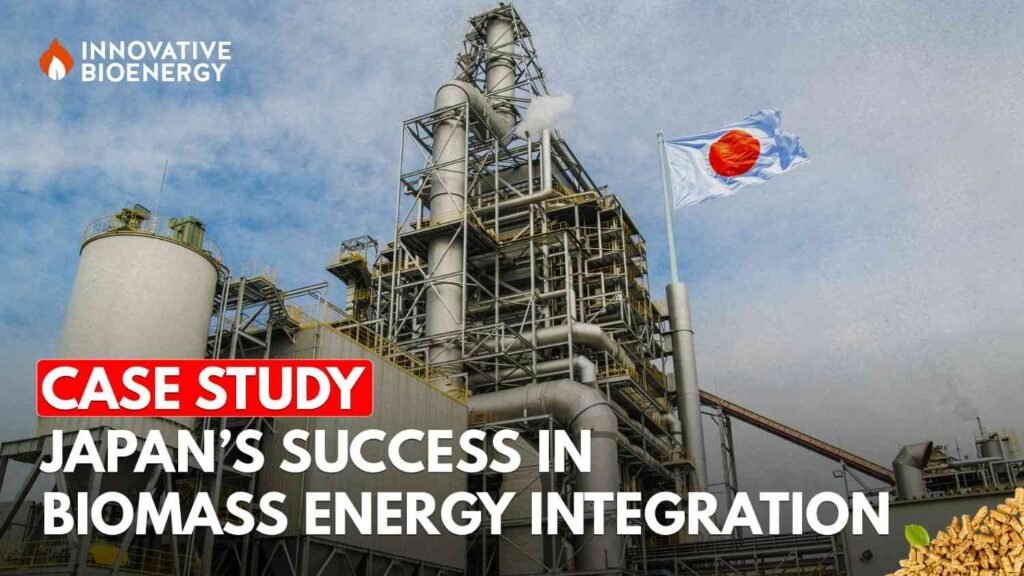Japan is now widely recognized as a global leader in biomass energy integration and renewable energy solutions. However, this success was not achieved overnight. Following the 2011 Fukushima nuclear disaster, Japan faced a severe energy crisis that demanded urgent and sustainable solutions.
With nuclear power plants offline and fossil fuel imports surging, Japan turned to biomass energy, particularly woody biomass, as a reliable, local, and clean alternative to secure its energy future and significantly reduce carbon emissions.
This case study explores how Japan developed its biomass energy sector through strategic planning, strong government policies, local partnerships, and technological innovation, creating a replicable model for sustainable energy worldwide.
Japan’s 2011 Energy Crisis and the Shift to Biomass Energy Solutions
Before 2011, nuclear power accounted for approximately 30% of Japan’s electricity supply. The Fukushima disaster forced the shutdown of nearly all nuclear plants for safety reasons, resulting in:
- An acute energy shortage,
- Rapidly rising fuel import costs,
- Significant increases in carbon emissions,
- Heightened concerns about energy security.
Facing these challenges, Japan urgently needed fast, sustainable, and renewable energy solutions. Blessed with vast forest resources and an established forestry sector, Japan identified woody biomass as a practical, scalable, and eco-friendly biomass energy solution.
Key Reasons Behind Japan’s Biomass Energy Success and Sustainability
Japan’s government prioritized woody biomass energy by focusing on wood residues such as forest thinnings, sawdust, and wood waste. The introduction of the Feed-in Tariff (FIT) system in 2012 provided guaranteed pricing for renewable electricity, including biomass power, which spurred investments and local business development in the biomass energy sector.
This proactive policy laid the foundation for Japan’s transition toward a more diversified and sustainable renewable energy mix.
Critical Factors Driving Japan’s Biomass Energy Growth
1. Reliable Local Woody Biomass Supply Chains
Japan developed a highly efficient and sustainable biomass supply chain by:
- Utilizing forest residues and wood waste that would otherwise go unused,
- Supporting regional forestry operations and rural economies,
- Setting stringent standards for biomass fuel quality,
- Building trust-based partnerships between local businesses, communities, and government bodies.
This well-organized supply chain system ensured a steady and sustainable biomass energy supply, making the technology practical and scalable across the country.
2. Advanced Technology for Biomass Energy Production
Japan invested in the latest technologies to generate both electricity and heat from woody biomass. Many facilities combine biomass energy with waste management processes to further reduce overall emissions, making Japan’s biomass plants environmentally efficient.
These plants are designed to use low-grade wood materials, which otherwise would be discarded, turning waste into valuable renewable energy.
3. Strong Government Policies and Financial Support
The 2012 Feed-in Tariff policy provided financial stability for biomass power plants, encouraging investors and businesses to expand the sector. Complementary government programs promoted cross-sector collaboration, provided technical guidance, and fostered best practices in the industry. This consistent support led to robust and steady growth in Japan’s biomass energy sector.
Environmental and Socioeconomic Impacts of Japan’s Biomass Energy
- Carbon Emissions Reduction: For example, woody biomass systems in Gifu Prefecture reduce over 14,000 tons of CO₂ emissions annually.
- Local Job Creation: Biomass energy projects have created sustainable jobs in forestry and rural communities.
- Enhanced Energy Security: By reducing dependence on imported fossil fuels, Japan has stabilized its energy supply and enhanced national energy security.
These positive impacts position Japan as a global leader and role model in renewable energy integration and biomass energy solutions.
Challenges and the Path Forward
Despite its successes, Japan faces ongoing challenges such as:
- Complex coordination across multiple industries,
- Balancing forest conservation with increased biomass demand,
- Integrating large-scale biomass plants with smaller community-based energy systems.
Future growth will depend on expanding decentralized bioenergy systems and incentivizing biomass use for heat production alongside electricity generation.
Global Lessons: How Innovative Bioenergy in Pakistan is Following Japan’s Model
Japan’s biomass success story offers valuable lessons worldwide. For instance, Innovative Bioenergy in Pakistan is adopting a similar approach by converting local agricultural and industrial waste into clean, cost-effective biomass fuels such as wood pellets and briquettes.
Innovative Bioenergy focuses on:
- Reducing operational costs for industrial clients,
- Offering sustainable alternatives to fossil fuels,
- Using decentralized biomass models inspired by Japan’s rural energy systems,
- Supporting ESG-compliant bioenergy business practices.
Like Japan, Innovative Bioenergy is addressing local energy challenges while promoting cleaner, greener energy futures globally.
Conclusion
Japan did not become a leader in biomass energy overnight, it was necessity, strategic planning, and smart policies that drove its success. Through efficient supply chains, local wood resource utilization, and supportive government policies, Japan transformed a national energy crisis into a long-term renewable energy solution.
This case study demonstrates that with the right mix of technology, policy, and partnerships, biomass energy can power a cleaner, more secure, and sustainable future.
Ready to reduce your carbon footprint with clean, cost-effective biomass energy? Contact us today to explore tailor-made biomass energy solutions for your industry!



